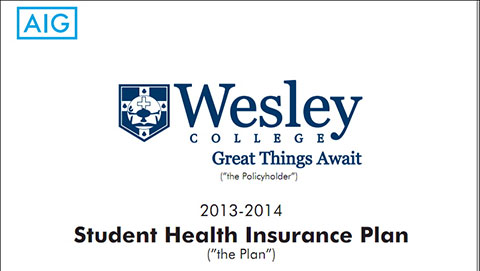By Melissa Boyd (Whetstone staff writer)
Sophomore Alainna Earl has her own health insurance, provided by her parents. But that doesn’t mean she doesn’t have to pay the $145 insurance fee from Wesley that’s included in students’ tuition.
“I think that is wrong because I feel like I should be able to choose where they want to have insurance,†she said. “I don’t know why the school is putting all these extra fees on us.â€
Wesley College has been charging the $145 to students for three years now. Prior to then, the college used to charge that fee to students – but students had a deadline to waive the fee if they had proof of independent health insurance.
Now, that fee is automatically included in the tuition, and no matter whether the students have outside insurance, they must pay the fee.
The health insurance policy began July 1, 2011, according to Eric Nelson, former vice president of finance at Wesley.
“In the year prior to the 2011-12 academic year, Wesley had a policy where students were charged individually if they needed insurance,†he said in an email. “We sent notices out then and it was posted on the tuition/fees section of the website when the policy changed.â€
Alumna Ashleigh Maser remembers when the college allowed students to opt out of the service.
“I had personal coverage under my parents’ insurance,†she said. “This doesn’t surprise me if there are changes in a policy. It happens all of the time.â€
This year, the fee is $145 per student, said Ron Reck, chief financial officer at Wesley.
He said Wesley uses a different approach than other colleges for student health insurance.
“Most states, but not all, require all students attending residential colleges and universities to have health insurance,†he said. “At most college and universities, the institution responds to that requirement by arranging for an insurance program that students may purchase.â€
Delaware requires students to have coverage for many ailments, including treatment of serious mental illness and drug and alcohol dependency, annual cancer screenings, birth control pills and devices.
At other schools, students may opt out of the purchase requirement if they can provide evidence that they have health insurance through their parents’ policy or through other private insurance, he said.
But someone at some time made the decision to charge students for the insurance whether they needed it or not.
Reck said he was not sure why the policy changed from having an additional fee to having the insurance automatically included in the tuition because he wasn’t here.
“When I came to Wesley in July, I was told that we did attempt to bill students at some point the past but the attempt was not well received by students or parents,†he said.
During the week of Nov. 11, students received postcards in the mail with their insurance information and a reminder to waive the insurance if they already had coverage elsewhere.
Reck said this was a mistake on the company’s part.
“The vast preponderance of educational institutions requires you to buy a policy or to opt out,†he said. “I think the insurer got mixed up and forgot that Wesley didn’t do that.â€
The company mailed out the postcards, saying the insurance was effective Aug. 1, 2013.
“We reminded them [the company] that we had a different business arrangement and asked them to stop doing that,†he said.
To find out more information on Wesley’s policy, students can go to http://www.studentinsurance.com/Schools/source/PDFs/brochures/DE/WESLEY/Wesleybro13.pdf.




